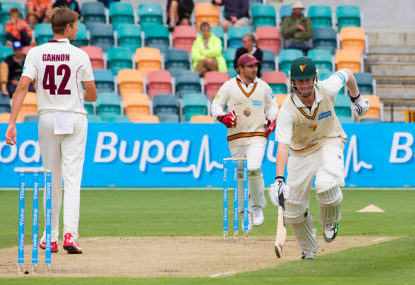WATCH: Freddy Flintoff's son dominates County 2nds game batting exactly like his dad
Check out some of the short-arm pull shots from Rocky Flintoff!

This season is the first in a two-year trial of a new points system for the Sheffield Shield. Will bonus points change the way teams play? Will it actually make any difference at all? I’ve done the maths so you don’t have to.
Gone are points for a first-innings win, replaced by a new bonus points system. Teams still get six for a win and three for a tie, plus there is now a point on offer for a draw.
Under the new system teams earn 0.01 points for every run over 200 that they score within the first 100 overs of their first innings, in addition to points for the number of wickets they take within the same time frame.
Teams gain half a point at the fall of the fifth, seventh and ninth wicket, again during the first 100 overs. Bonus points apply for each team’s first innings – i.e. the first and second innings of the match.
I took a couple of hours and went back through the entire 2013-14 Shield season to see if the new points system alone would have made a significant difference.
In short, it didn’t make much difference at all. But that is only part of the story.
Under the previous points system this is how the teams finished up last season.
1. NSW – 32
2. WA – 26
3. SA – 26
4. Queensland- 24
5. Tasmania – 22
6. Victoria – 10
With the new scheme applied there are only minor differences, and both outside the top two, so the Shield final wouldn’t have changed.
1. NSW – 49.47
2. WA – 44.26
3. SA – 40.92
4. Tasmania – 38.46 (up 1)
5. Queensland- 37.60 (down 1)
6. Victoria – 24.24
The main change is that Queensland and Tasmania swap around, this is simply because Queensland would have collected the second fewest bonus points behind wooden-spooners Victoria – approximately three fewer than Tasmania.
The only other difference is that Western Australia would have made the final on points alone, run quotient wouldn’t have been needed to split them from South Australia. In general, I suspect run quotient isn’t going to matter at all under the new scheme.
It has been suggested that the change in points is largely designed to encourage attacking play during the first couple of days, with the hope that it makes an outright result more likely.
Shield matches last season saw 40 per cent end in a draw. However, if the points on offer were actually different last year it seems highly likely that many of those drawn matches might have produced a result – and that could change the final table significantly.
I must also note that my calculations for the bonus points are not 100 per cent accurate. I was working off the scorecards and commentary available online, but in cases where a particular innings stretched beyond 100 overs and there was no commentary provided, I was unable to get the exact number of runs a team had at the conclusion of their 100th over.
In those situations I used the fall of wicket data and a bit of rough maths to come up with an approximate total they might have had. This only affected 11 of the 60 innings, and given that we are only talking 0.01 point per run, it seems unlikely that it would have changed the eventual order.
So will the changes have a significant impact on the outcome of this year’s Sheffield Shield? We’ll have a rough idea by the time we hit the BBL-enforced break, but my gut feeling is that it will be minimal.
That said, I suspect we are likely to see more matches finish in a result over the course of the season, and perhaps more attacking declarations in the first two innings of the match – once there are no more bonus points on offer – neither of these can be a bad thing.
We have already seen one example of this in the opening round of the 2014-15 season, with South Australia declaring their first innings 75 runs behind, yet they still fought back for a solid victory.
So, heading into the second round – which will also be played under lights with pink balls – Victoria, last year’s wooden-spooners, sit on 8.85 points and hold a slender 0.18 point lead over Western Australia.
The age of decimal places is here.